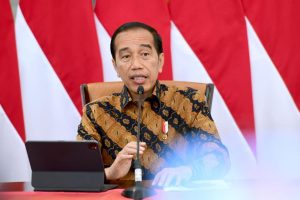Indonesia’s President Joko “Jokowi” Widodo yesterday announced that the country will ban exports of bauxite starting in June 2023, underlining his government’s determination to develop a domestic mineral refining and processing industry.
“The government is committed to continually building sovereignty in our natural resources sector and add value to domestic [products] in order to open as many jobs as possible, increase foreign exchange, and create an even economic growth,” the president said, while announcing the policy at the presidential palace in Jakarta.
As with an earlier ban on exports of unprocessed nickel ore, the ban on washed bauxite ore is intended to force foreign companies to invest in bauxite processing facilities in Indonesia, to increase how much the country earns from its natural resources.
Jokowi acknowledged that in the short term, the ban would likely lessen shipments of bauxite to overseas buyers before the benefits of the policy begin to be felt. According to a report in Tempo, Indonesia could lose between $500 to $600 million per year for the first few years.
“Usually, there is a decline in export value at the beginning, but in the second, third, fourth year [of the policy implementation], the leap may start to be visible,” Jokowi said. “So don’t hesitate, I tell the ministers to not worry about this policy, we have to be confident.” The Indonesian leader estimated that the ban would eventually increase the state revenue from 21 trillion rupiah ($1.35 billion) to 62 trillion rupiah ($3.9 billion).
The export ban, which had been foreshadowed by comments from Indonesian officials, followed Jokowi’s announcement that Indonesia would appeal a recent ruling from the World Trade Organization (WTO) over its three-year-old ban on nickel ore exports.
Indonesia, previously the world’s biggest exporter of nickel ore, declared a ban on the export of the unprocessed mineral in August 2019, and introduced domestic processing requirements that have required businesses to process or purify raw materials in Indonesia before exporting them. These measures came into effect at the start of 2020, shortly after the European Union filed a complaint with the WTO.
In its ruling late last month, the WTO panel concurred with the EU’s claim, stating that neither the prohibition of nickel exports nor the domestic processing requirement (DPR) violated global trade rules.
But Jokowi said that Indonesia would not bow to the dictates of the WTO, especially when the world’s most powerful countries very often refuse to do so. “We want to be a developed country, we want to create jobs,” Jokowi said at the time. “If we are scared of being sued, and we step back, we will not be a developed country.”
The Diplomat’s economics columnist James Guild observed this week that this is consistent with a long-standing Indonesian determination to develop its own industries, rather than allow its raw materials to generate wealth abroad. As he put it, “the nickel is in Indonesian soil, and the government wants to extract as much value from it as it can, whether that conforms with free market principles or not. If that means roiling markets and rejecting free trade, that is perfectly fine.”
Guild also noted that the Indonesian actions were part of a growing trend of economic nationalism in an era of growing strategic competition. “Countries around the world are resorting to what we might call economic statecraft, the use of policy tools such as tariffs and export bans to intervene in markets in the pursuit of national strategic goals,” he wrote.
The question is how many other raw materials will receive a similar treatment in the months and years to come – Jokowi has already flagged possible restrictions on the export of tin and copper – as well as how this might impact Indonesia’s relationships with its major trading partners.

































